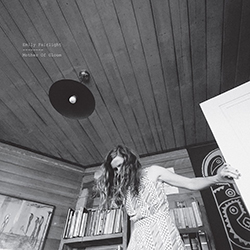Emily Fairlight - Album Review: Mother of Gloom
 Autumn at dusk. Sitting in a bay window, knees to chin, wrapped in sweatered arms.
Eyes to the fogged glass that obscures the wind and rain enveloping the grey
city. Watching the streetlights flicker on as the sky dims.
Autumn at dusk. Sitting in a bay window, knees to chin, wrapped in sweatered arms.
Eyes to the fogged glass that obscures the wind and rain enveloping the grey
city. Watching the streetlights flicker on as the sky dims.
Or a dingy, wood floored coffee shop, room the size of your lounge, the loneliest patron.
These are the best places to listen to Emily Fairlight’s Mother of Gloom.
I think haunting is a word thrown around all too quickly when reviewing soulful emotive voices. I think what people are trying to say is that the music, the voice, is ethereal. Dream-like. Draped in a dark, sombre mood they rarely feel to name.
I guess I mean all those things too when I describe Emily Fairlight’s voice as haunting, but I also mean it in the more literal term, in that it stuck with me, as my earworm, the ghost on my shoulder. I had to keep going back to it. Those lines from The Ancient Mariner, no doubt a popular refrain in live renditions.
Am I going soft in my old age?
Is this the point I decide to grow my beard, wear plaid, and listen to folk music?
Have I found the comfort that waiting for Tool fails to provide?
Inappropriate (at any time, not just in this social climate) I know, but I’d have liked to approach Fairlight. In another life, as another person. The kind that approaches people and tells them they like their style.
That the new album is beautiful, though beautiful feels too bright a word to describe something so dark, and dark too pessimistic to describe the warmth I feel.
That they feel her melancholy and relate to it.
Ask her if she’s okay, if only to see her smile, and reassure me it’s all just an act. A persona. Like Lana Del Ray’s fabricated emotion. So, I can know I'm still the only one that feels this way.
Why do I use Del Ray as a reference, when Fairlight is undeniably better?
There’s Del Ray in Fairlight’s voice, but there’s earlier influences like the vibrato of Stevie Nicks, and tone of Joan Baez. Unlike Del Ray the music is real, not electronic nonsense. A banjo, the strings, a horn. The strum like a slowed steam engine. With the occasional influences from old time French and Spanish there’s nostalgia, like Mother of Gloom is an artefact from the 60's.
Do we always covet the decades before us?
They call Mice on Stilts Doom-folk, or at least Mice on Stilts do, but there is still hope in their Hope for a Mourning. This is Doom-folk. A soundtrack for the forest around me on my long cold walk to work. No doubt the soundtrack for the long train rides across the countryside of Japan next week. A soundtrack for this Autumn dusk, in a bay window, my knees to chin, wrapped in sweatered arms.
Take my five stars. Give me back my ears, my angst, so I can feel discontent again, and not feel like this album is my home. My comfort.
Review written by Peter-James Dries
About Emily Fairlight

Visit the muzic.net.nz Profile for Emily Fairlight
Releases
Other Reviews By Peter-James Dries
 AJA - Album Review: Kawai
AJA - Album Review: Kawai
13 Dec 2024 // by Peter-James Dries
Bilingual albums shouldn’t be special; they should be the norm. Or at least more common.
Read More...
 Ra Charmian - Album Review: Waiata Wairua
Ra Charmian - Album Review: Waiata Wairua
08 Oct 2024 // by Peter-James Dries
Waiata Wairua is an album that wouldn’t feel out of place performed in a late night jazz hall in some alternate history where the successes of the Maori battalion lead to a proliferation of Te Reo worldwide. The sort of interest that saw your dad singing in French in the 60's, when Mireille Mathieu was knocking about.
Read More...
 Ben Lloyd - Album Review: Leap of Faith
Ben Lloyd - Album Review: Leap of Faith
26 May 2024 // by Peter-James Dries
For over 30 years, this self-taught rocker from Mt Maunganui has been writing music. Now, for the first time since 2013, we finally get to hear his songs.
Read More...
 Yann Le Dorré - Album Review: The Circus is Closed
Yann Le Dorré - Album Review: The Circus is Closed
19 Dec 2023 // by Peter-James Dries
“We are Sex Bob-Omb and we're here to make you think about death and get sad and stuff!” - Scott Pilgrim vs.
Read More...
 Sanoi - Album Review: Echoes Of Home
Sanoi - Album Review: Echoes Of Home
25 Nov 2023 // by Peter-James Dries
Electronica offers no escapism for me. It’s more of what I already have.
Read More...
 Throng - EP Review: Decoherence
Throng - EP Review: Decoherence
20 Oct 2023 // by Peter-James Dries
You know that thing where the letter B has a personality, or words have textures and colours? That’s called synaesthesia.
Read More...
 Fortress Europe - Album Review: Old World
Fortress Europe - Album Review: Old World
10 Oct 2023 // by Peter-James Dries
Have you ever been torn between listening to Mozart or Periphery? Does Epica have too much of that darn singing for your tastes?
Read More...
 Yurt Party - Album Review: Yurt Party
Yurt Party - Album Review: Yurt Party
07 Sep 2023 // by Peter-James Dries
It sure isn't summer, and this is really not the Balkans, but Yurt Party’s new self-titled album refutes that. Back with another one of them Balkan rocking beats, Yurt Party’s debut is jazzy, erratic, and full of zest and energetic grooves, with flavour notes of ska, dub, and bergamot.
Read More...
Most Viewed Artists
Latest Galleries
NZ Top 10 Singles
- APT.
ROSÉ And Bruno Mars - DIE WITH A SMILE
Lady Gaga And Bruno Mars - BIRDS OF A FEATHER
Billie Eilish - TASTE
Sabrina Carpenter - I LOVE YOU, I'M SORRY
Gracie Abrams - ESPRESSO
Sabrina Carpenter - SAILOR SONG
Gigi Perez - LOSE CONTROL
Teddy Swims - A BAR SONG (TIPSY)
Shaboozey - GOOD LUCK, BABE!
Chappell Roan










 Report A Problem
Report A Problem

